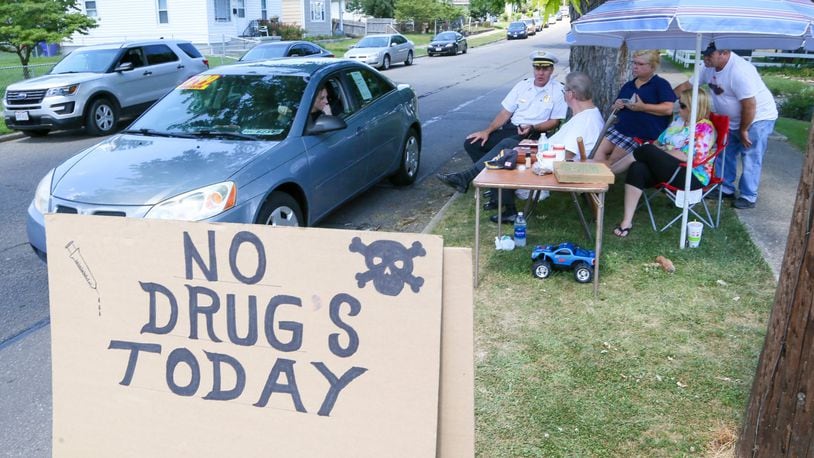MORE: A look at drug overdose deaths by Butler County community
There have also been hundreds more people every year that survive a drug overdose, according to the data.
But there is hope highlighted by the data.
Through the first four months of 2018, Middletown has seen a near-60 percent drop of drug overdoses over the first four months of 2017, according to Middletown EMS runs. Middletown City Manager Doug Adkins attributes that to the work of the 13 heroin summits and its partnership with Atrium Medical Center.
“We’ve been working on this for two years and the entire community has come together to work on education, interdiction, treatment and post-treatment options,” Adkins said. “We’ve had an operating syringe exchange program for almost two years and our Heroin Response Team has placed over 250 people into treatment since its inception.”
MORE: Middletown hospital reports fewer overdose patients. Here’s why they think that number is down
Additionally, Adkins said the police department had added four new K9 officers and that “has resulted in less ODs, more people gaining treatment and more drug trafficking arrests over the past year.”
“It took all of these pieces working together to see the reduction in calls for service,” he said.
That success is what others in Butler County want to see in their communities: a downward trend.
“Anytime you have a death, it’s something that’s concerning. That’s something you don’t want to see … you don’t want to see people dying of overdoses,” said Fairfield Police Chief Steve Maynard. “I think everyone wants to see a reduction in the numbers because that is the gauge of the impact that you’re making.”
The example in Middletown, and the success so far this year, demonstrates Maynard’s point — and the point of others — that “this is not just a law enforcement problem. This is something that affects everyone.”
MORE: Alleged drug dealer charged in Hamilton woman’s OD death
“Most people are impacted in one way or another,” he said. “You can be directly impacted by this and not be a victim to it. Very few people are immune.”
Hamilton Police Chief Craig Bucheit said the department’s efforts focus aggressive enforcement and outreach.
“The combined results of these efforts have led to a 30 percent reduction in overdoses and over 70 percent increase in drug-related arrests for the year to date,” he said.
While the primary tool in addressing the opioid epidemic is proactive and aggressive law enforcement, “we also recognize that this epidemic is too large and too complex to address through any one-size-fits-all approach.”
This is echoed by many of Butler County communities, and one tool that Middletown, Fairfield, Hamilton, Fairfield Twp., Oxford and Butler County has implemented are quick response teams. More than 1,800 have been contacted by these teams that consist of a police officer, EMT and social worker, and 37.4 percent have gone into treatment, according to the health department report, according to the health department report.
MORE: Butler County unveils new tool to attack heroin
“I think everyone has a responsibility and we as law enforcement are trying to do what we can to have a positive impact,” he said. “All people look at law enforcement on the enforcement side, but we can also be on the front lines in education and treatment.”
But treatment isn't the only thing Hamilton has pursued, Bucheit said. John Bradley Smith, 40, was charged with involuntary manslaughter and drug charges for allegedly furnishing drugs to a woman who died of an overdose, the Journal-News reported this past fall. He was convicted of involuntary manslaughter, a first-degree felony, on March 20.
West Chester Twp. spokeswoman Barb Wilson said data and trends are studied and used to determine the allocation of resources, and the police department “works closely with the Butler County Coroner’s Office, the county health department and surrounding agencies to monitor this type of data and the trends in order to provide the best service possible to the community.”
“The West Chester Police Department combats drug issues in the community by comprehensively investigating drug-related cases beyond the overdose itself to the possible source of the drug,” she said. “The police department also works with local retailers and others who are impacted by theft, often as a result of illegal drugs, to identify trends and share information. West Chester Police and Fire Departments also work through schools and social service agencies to support education efforts.”
The state has helped by passing House Bill 110 in 2016 which included the "9-1-1 Good Samaritan law." This bill prevents anyone seeking medical assistance for a drug overdose won't be charged with drug possession — which can range from a minor misdemeanor to a fifth-degree felony — but instead police officers can issue a disorderly conduct court summons in order to help them get into treatment.
“The 9-1-1 Good Samaritan Law is an important part of a larger package of legislative initiatives to address Ohio’s addiction epidemic, and I appreciate everyone’s contributions to pass this bill into law,” said Rep. Robert Sprague, R-Findlay. “It is our hope that this bill will urge individuals to seek help and save lives.”
About the Author
